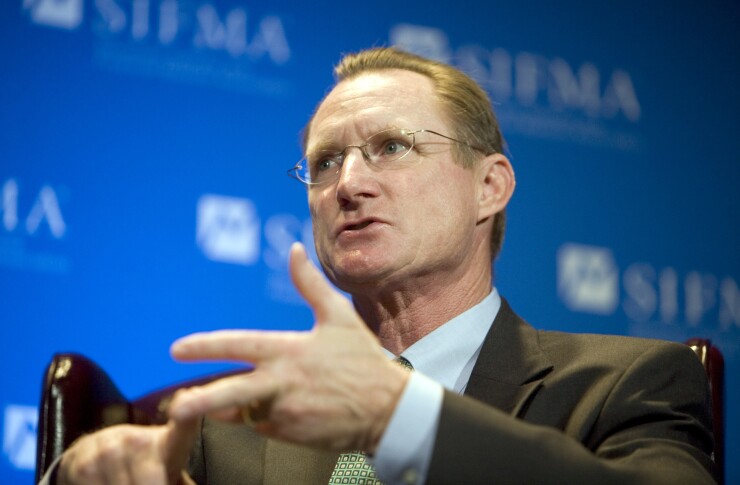Coronavirus-related disclosures increased again since the past week, skyrocketing to over 5,500 as various sized municipalities attempt to tailor what and how to disclose pandemic challenges. Issuers are also now referencing the CARES Act in their disclosures.
In a report released by the Municipal Securities Rulemaking Board Tuesday, COVID-19 related disclosures increased by 22% to 5,517 from 4,516 just since last week.
“They’re continuing to grow at a double-digit percentage increase week over week,” said Mark Kim, MSRB chief operating officer. “We are expecting to see them increase over the coming weeks. So far we haven’t seen a peak in the disclosure submissions.”
Kim said he wouldn’t be surprised to see another week of 1,000 plus disclosures.

The MSRB also said more municipalities have begun referencing CARES Act loans.
“We’re starting to see issuers take advantage of some of the regulatory relief being provided under the CARES Act,” Kim said.
In a recent filing, the Benevolent Corporation Cedar Community received $352,145 in U.S. Department of Health and Human Services funds. They also received $3.2 million in Paycheck Protection Program Loans to be used for payroll, utilities and mortgage interest expenses.
Champlain College through which it benefits from $74 million in revenue refunding Series 2016 bonds from the Vermont Educational and Health Buildings Financing Agency, also received CARES Act funding in the form of emergency grants to students and an institutional allocation to support operations disrupted by the virus.
“The full impact of COVID-19 and the scope of any adverse impact on the college finances and operations cannot be fully determined at this time,” the college wrote in the filing.
As a whole, large to small issuers are facing questions of what to disclose, how much and how often during the pandemic.
In a Government Finance Officers Association’s webinar last week, state and local government officials discussed the Securities and Exchange Commission’s statement on disclosure from earlier this month. Since the start of the pandemic, issuers are attempting to grasp how disclosure may differ depending on the municipality.
“One thing that you’re going to hear throughout, this is not a mandate,” said Ben Watkins, Florida’s director of bond finance. “This is not a one-size-fits-all, you’re going to have to tailor it to your individual circumstances.”
In its
For the state of Florida, Watkins focused on its most vulnerable credits, such as toll roads, higher education and finally, general disclosure for the state.

For now, Watkins filed Florida’s disclosures on the MSRB’s EMMA site and the state’s investor site.
“That’s all we plan on doing for now until we have some more significant development that we feel like we need to provide additional disclosure to the marketplace,” Watkins said.
Dan Deaton, partner at Nixon Peabody, said issuers are not obligated to update their disclosures, but need to say that in their disclosures.
“The mere fact that someone puts out a voluntary disclosure today doesn’t obligate them to put out a voluntary disclosure down the road,” Deaton said. “It would be important for the voluntary disclosure to say that.”
Deaton said when working with issuers, the inability to know how COVID-19 will affect municipal finance often “blinded” issuers to what they did know. However there are some factors issuers do know, such as revenue impact, liquidity, known events and financial scenarios.
“Everybody does not know what next year will look like,” Deaton said. “But everyone will have to have a budget, everyone will have to make management decisions, everyone will have to make big decisions over the next few weeks to get to the end of the fiscal year. And everyone is using something to make those decisions.”
Contra Costa County on the outskirts of San Francisco released its five-page COVID-19 voluntary disclosures on April 28.
"One of our takeaways to leave with, as you consider making voluntary disclosures, you have to look at your unique situation and how the pandemic is impacting your jurisdiction specifically, said Tim Ewell, the county’s chief assistant county administrator during the webinar.
Ewell noted that California was one of the first states to be affected by the virus. As he was deciding how to approach voluntary disclosure Ewell said counties were in a unique position since they were on the frontlines responding to the pandemic.
“The question became, what kind of information should be included in that disclosure, what kind of guidance did we have at that point to move forward in determining that,” Ewell said.
Topeka, Kansas is different from counties as the city is not as much on the frontlines and the counties are doing more. Instead, Jessica Lamendola, Topeka’s Director of Administrative and Financial Services, focused on the virus’ impact on its revenue.
“We're looking at revenue projections, but we haven't seen a significant uptick in expense though that doesn't mean we won't,” Lamendola said. “So trying to prepare information to share with the public, not just with the investor community, has been challenging in the way that we receive our revenues.”
Topeka goes to market at least once a year and Lamendola said they were actively disclosing financial information on the city’s website as well as regular reports. The city has an operating budget of about $300 million, of which $100 million is the general funds, Lamendola said.
About 32% of the general fund is sales tax, but the city won’t have actual information on April sales taxes until June, which is then when Lamendola would consider what to voluntary disclose.
Disclosure for smaller issuers is difficult, especially when deciding how to disclose certain credits, Lamendola said.
“I don't have a dedicated debt analyst,” Lamendola said. “I don't have a dedicated disclosure analyst. We are a small team covering all of the financial operations for the city’s debt and disclosure are small pieces of what we do.”





